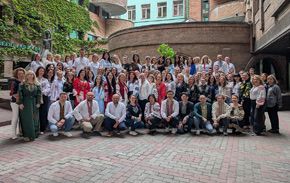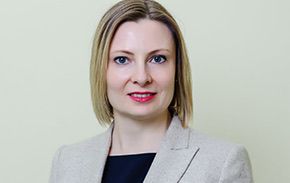Delo.ua, 10.07.2025.
How to support colleagues in times of war and why true adaptation of veterans begins with changing the culture within the company and assisting the business. Olena Urusova, HRD at Credit Agricole, spoke about the experience, insights, and real-life stories of supporting employees, including mobilized colleagues, veterans and their families.
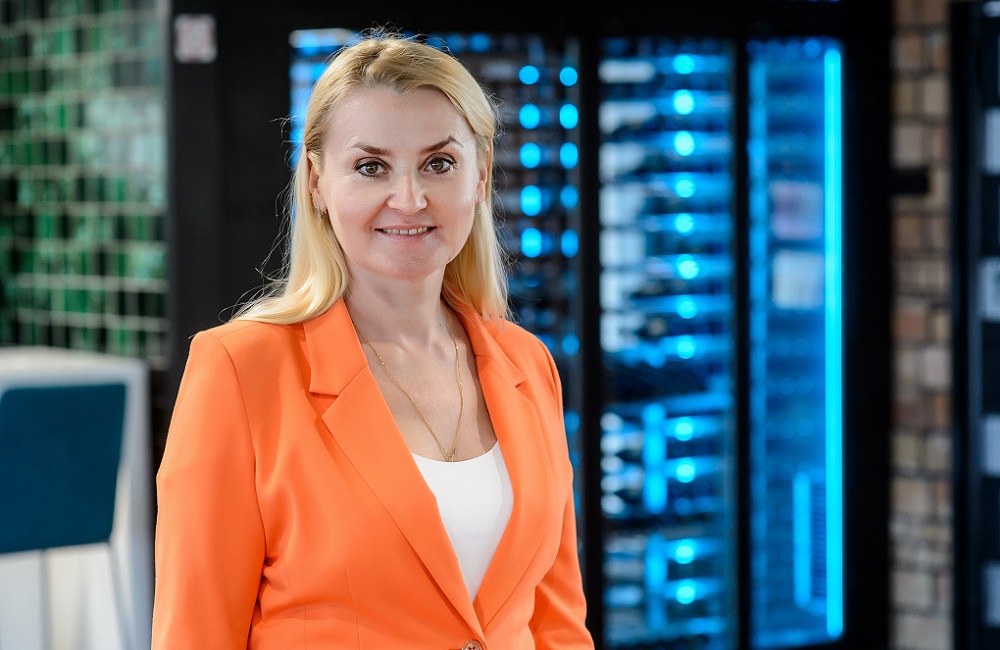
Olena Urusova, HRD at Credit Agricole
The war and the shortage of personnel made the effort to retain and develop personnel extremely important. What’s your approach to this challenge?
This has always been a difficult issue, regardless of the time. We consider work with personnel as a complex task, where not separate initiatives are applied, but the entire HR and social policy of the bank. We adapted our processes to the new labor market, in particular, changed approaches to recruiting, strengthened social programs and EVP to support our team and be able to attract talents within the labor market. We focus not only on training and development of employees, but also on social programs, which come to the fore due to the war.
What speciality is currently the scarcest in terms of the financial sector?
I can’t single out one scarce speciality, because the situation is rather challenging in all realms. Even finding a customer service expert for outlets is already a difficult task. The market is narrow, migration and mobilization have had a very strong impact.
We are not looking for a magic pill. Perseverance, new approaches, going beyond standard tools help us to move forward. Also, we actively deal with internal mobility, as well as horizontal transitions. It is with this aim in mind that we have created a holistic ecosystem of training programs, namely Agrischool, Managerial School, Proximity University. These are three corporate training projects aimed at increasing the expertise of our team in various business lines, revealing human resources potential and ensuring the stable development of the bank. This year we are adding another program to support and develop the management team.
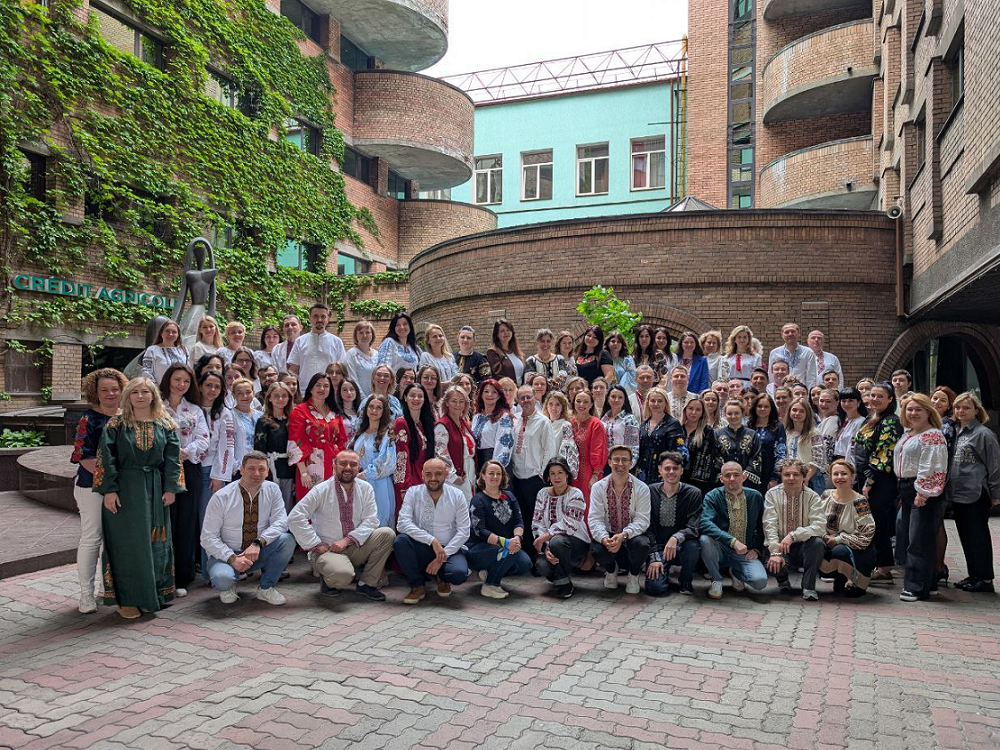
Credit Agricole employees on Vyshyvanka Day 2025
What are candidates most interested in nowadays? What do they pay attention to when looking for a job: the employer's brand, the company's stability, reputation or finances?
It cannot be said that everything comes down to finances alone. I am convinced that behind the financial aspect there is always an issue of loyalty to the employer. Candidates study the company's reputation: is it stable and fulfills its social obligations or is it laying off staff? During the war, this has become vital.
Interestingly enough, candidates often ask whether the company assisted with evacuation at the beginning of a full-scale invasion, or does it provide additional financial assistance to those affected by the war? This has become a kind of litmus test of the employer's social responsibility. Meanwhile, it is also important whether the company operates transparently and pays all taxes. Hence, nowadays many factors influence the candidate's final decision.
According to the studies, people prefer working in socially responsible companies. May Credit Agricole be considered as one of them?
For nine years, the bank has been running “We Care!”, a large-scale CSR program. It covers four key areas, namely charity, volunteering, employee care and environmental initiatives. More than 100 charitable initiatives worth over UAH 170 million are the result of the “We Care!” project since the beginning of the war. Most of the funds were allocated to the purchase of medical equipment for hospitals, two top-equipped ambulances, assistance to social institutions, and orphanages.
The international Credit Agricole Group made its contribution to supporting the recovery of Ukraine. In 2024, we created an intensive care unit in the Kyiv Perinatal Center that is the largest initiative over the years of the bank’s operation in Ukraine. The project, worth UAH 45 million, provided for a major renovation of the premises and the purchase of 130 units of state-of-the-art medical equipment. Thanks to this initiative, doctors are saving even more newborns – children who were born prematurely and need special care.
What team support programs do you have? Do they include psychological, financial, and security assistance for employees and their family members?
For more than five years, we have been telling our colleagues and society at large “You can rely on Credit Agricole.” This has become a kind of credo even during the COVID-19 pandemic and has remained relevant in wartime. These are not just words, but real aid to employees, especially in difficult times.
The bank implements Credit Agricole welfare program. Its goal is to create a workspace where our people feel comfortable, protected, and confident. This is how we help maintain motivation and productivity against the backdrop of total stress and fatigue. The welfare program covers three core areas, namely physical safety, financial well-being, such as salary, a motivation system, and additional financial payments. Also, mental health − psychological assistance is available to both employees and their family members, including children and relatives of military personnel.
We have a robust health and life insurance program. Thanks to the Solidarity Fund established by the French Group, we also provide additional financial assistance to colleagues and their families who have lost their health or whose homes have been damaged or destroyed because of the war.
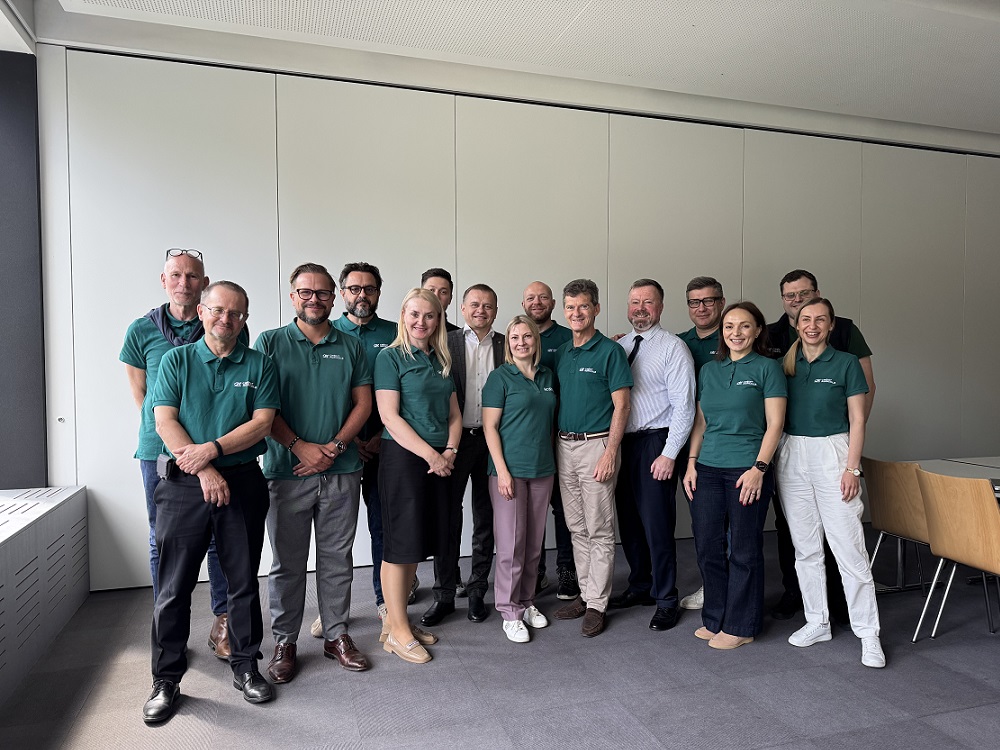
Visit of the Credit Agricole Management Board to Poltava within the Ukrainian regional tour
Could you tell us more about health insurance? Have you changed or improved this program recently?
Yes, in 2024 we strengthened the part of health insurance related to critical illnesses and added coverage of accidents caused by passive military risks to the life insurance program. We have seen an increase in cancer treatment aid requests not only from older employees, but also from young people. Therefore, we have included an annual check-up with tumor markers tests, diagnostics of the abdomen, thyroid gland, cardiogram and hormone level testing. These are not just technical changes in the insurance policy, they are a response to the requests of our employees about what is relevant to them now.
What other team support practices have been introduced?
Against the backdrop of the cancellation of holidays in Ukraine due to martial law, we added three paid days off after three and a half years: for Christmas, New Year and Easter. We also introduced a day off on the occasion of birthday and September 1 for parents of first-graders – they are reimbursed. Furthermore, there is a social volunteer day, when once a month an employee has an opportunity to take a paid day off to participate in initiatives for the benefit of society. Weaving camouflage nets for the frontline, helping the elderly and animal rescue are among the most popular activities.
As usual, we have held a Blood Donor Day at the head office and in the regions. Since the beginning of the year alone, our colleagues have donated over 60 liters of blood. Donors also receive an additional day off. We cannot help but admire the kind hearts of our colleagues. They volunteer, raise funds for children with cancer, and participate in charity races.
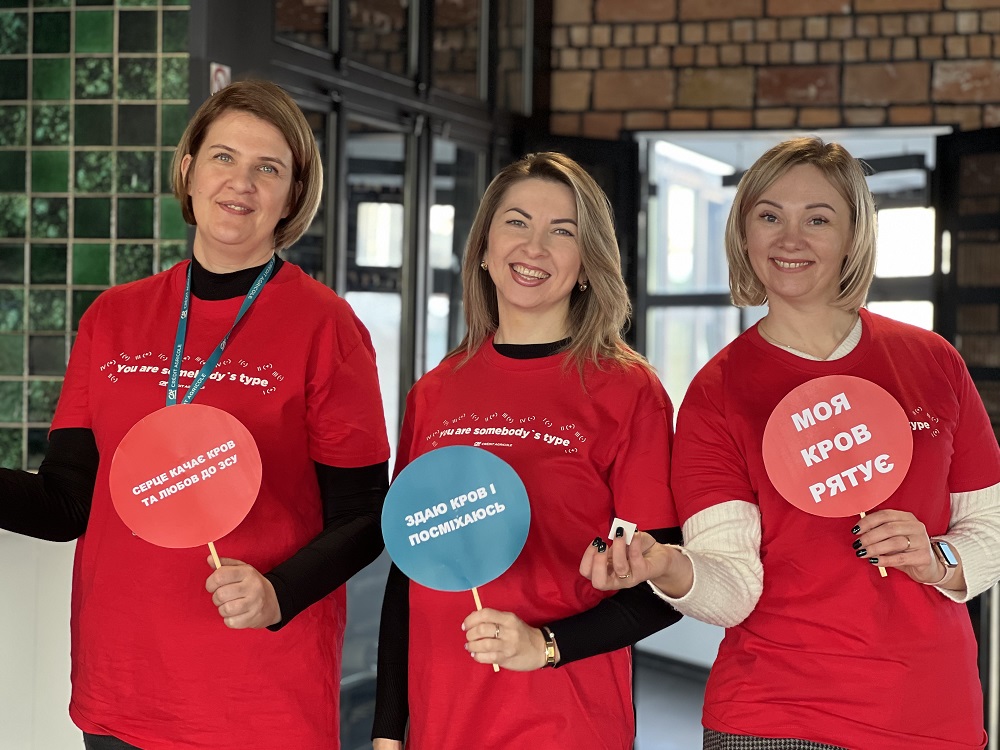
Traditional Blood Donor Day at Credit Agricole's head office 2025
Which programs were the most efficient or in demand?
We received the most positive feedback on the recreational and recovery program in health resorts. We have already organized three waves in different seasons. Employees and their families have the opportunity to rest. This is the case when the feedback is extremely positive and constructive.
There was, for instance, a heart-touching case when our employee was reunited with her husband, a serviceman, in a health resort – for them it was the first meeting after a long period of his service. In general, families of mobilized employees and veterans, as well as employees from frontline areas, have priority for staying in health resorts.
Which program is the most big-budget? Could you name its cost per year?
We implement systemic and large-scale initiatives. In 2024, the budget for the welfare program was 5.6% of total personnel costs, which is twice as much as in the pre-war years.
It is medical insurance and life insurance that are the most big-budget programs. They cover all employees, which is 2200 people, as well as partially their families. The bank spends approximately UAH 60 million on them per year. CAU allocated UAH 16.5 million per year to the recreation of colleagues and their families in health resorts during 2023-2024. But for us, such investments are invaluable, because they are a contribution to the recovery of the team and the nation.
How do you monitor the effectiveness of the programs?
We apply internal tools such as short surveys, feedback after participation in the programs. Additionally, feedback is collected by our providers of medical insurance and psychological assistance. We respond very open-mindedly to employees’ opinion. In terms of recreational and recovery program in health resorts, we receive the most thanks. In most cases, people are more willing to talk about shortcomings, but here it is the opposite.
What should you start with if you want to effectively launch such social programs?
There are programs that should be implemented immediately, without discussion, for instance, health insurance and psychological support. These are basic things that every company should have. Next, you need to work on expanding, promoting, and people will start to apply and show initiative themselves. Generally speaking, it is worth conducting employee surveys, finding out their needs and feedback. To illustrate the point, the volunteer initiative emerged in response to such requests. We thought, what if we give colleagues a day that will benefit society and at the same time switch the person to another activity? Thus, this idea appeared.
It is a very similar story with veteran programs, when we got the idea that we did not have many veterans, but there were families of mobilized employees: husbands, sons, fathers of our colleagues. We started with surveys to find out their needs, how we can assist. I believe that there are many cases where employers might be really effective.
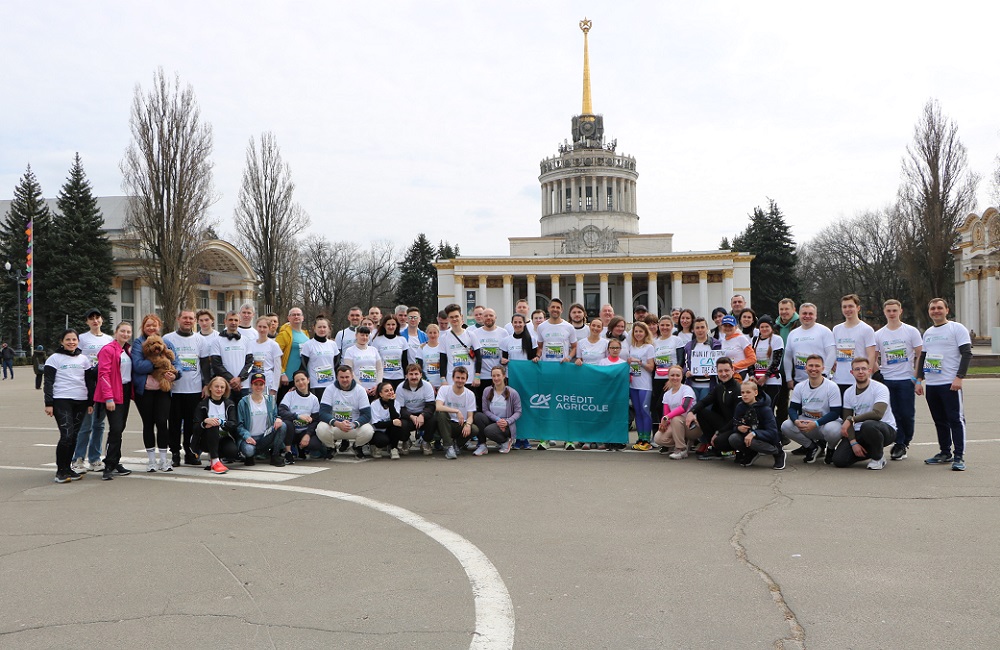
Employees of Credit Agricole participate in Kyiv Half Marathon 2025
How many veterans returned to work in the company after demobilization?
In total, we had seven demobilized people. Five of them have already returned to work, two decided to quit. If a person wants to return, we are always willing to provide them with a job.
How do you keep in touch with mobilized employees and veterans?
We have streamlined the work with mobilized and demobilized employees by creating the position of coordinator and a separate communication channel. This person is responsible for continuous communication, knows person’s location and situation in general. We also maintain contact through direct managers. If contact with a person is lost, then we call families. Special attention is paid to communication with relatives, because it is significant to us that they feel cared for.
Recently, I had a conversation with our mobilized employee. Now he is an artillery platoon commander and serves on the front line. I asked him about his plans for the future, whether he wanted to return to work at the bank after the war or, maybe, start his own business. “I dream of returning to my workplace. I do want a civilian, normal life.” he said. Moreover, he highlighted another important issue − many mobilized people feel forgotten. At first, employers called them, offered help, and asked how they were doing. And when a year, two, or three passed, they often forgot about them. So, it's us, civilians, who should call first, not wait for them to call.
I personally had a similar experience. One of our employees was undergoing rehabilitation. I expected him to call when it was convenient for him, but at his rehabilitation center they told me, "Call first." I listened to this advice and called him. And you know, the conversation was so easy, as if we had only seen each other yesterday, although three years had passed. It's essential for us to support mobilized people, to keep in touch with them, to show that we are waiting for them.
What is your opinion on the authorities’ intention to introduce quotas for veteran employment?
This idea isn’t brand new. There are quotas for people with special needs and the elderly, but everything is not working perfectly. The veteran topic is not just about quotas, it is about inclusion. And here everything is much deeper, because we need to rebuild corporate culture, train people, teach how to communicate with veterans. For instance, we organized corporate trainings for colleagues on this topic, and they give feedback that this knowledge helps not only at work, but also in everyday life.
Another aspect is the physical environment, because the premises will have to be re-equipped. Let me give you an example: it may seem like a trifle, but hand dryers in toilets can cause a panic attack in a person traumatized by war. Therefore, I couldn’t tell you whether quotas will help, but I feel that a large-scale state campaign is needed to support and promote the adaptation of veterans to civilian life. And this is society that needs to adapt to the veteran, not the other way around.

 Useful information
Useful information
 Useful information
Useful information
 Useful information
Useful information
 Useful information
Useful information
 Useful information
Useful information
 Useful information
Useful information
 Useful information
Useful information
 Useful information
Useful information
 Useful information
Useful information
 Useful information
Useful information
 Useful information
Useful information
 Useful information
Useful information
 Useful information
Useful information
 Useful information
Useful information
 Useful information
Useful information






